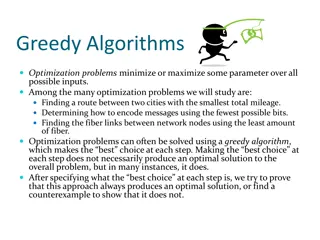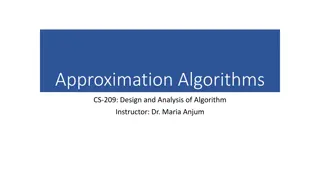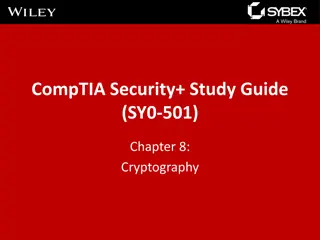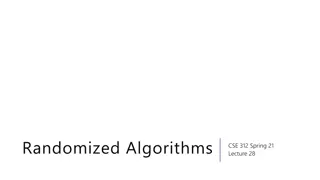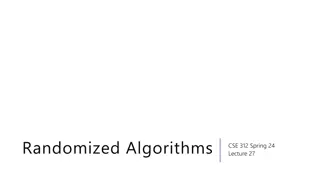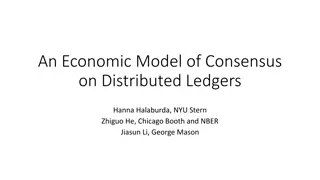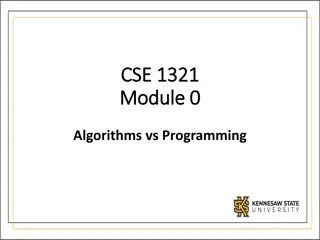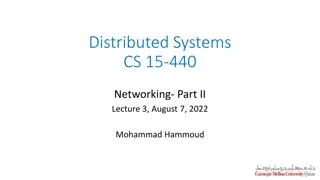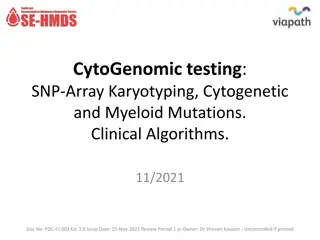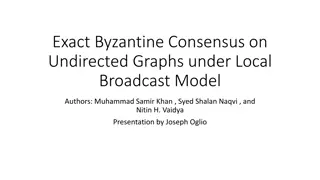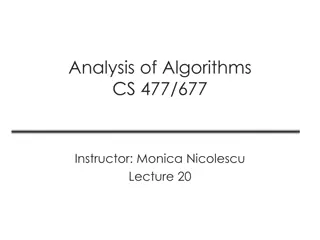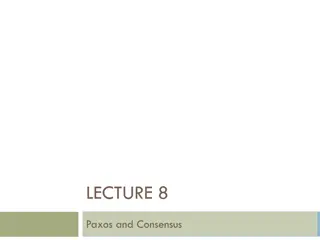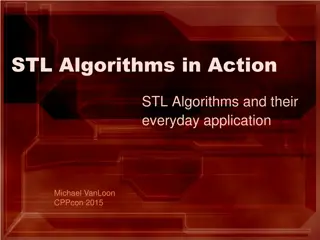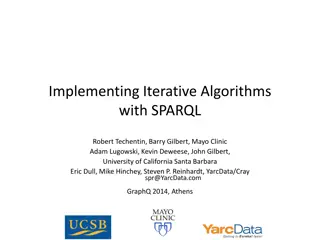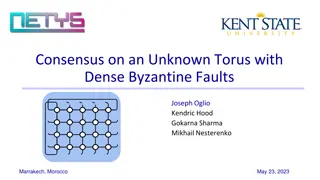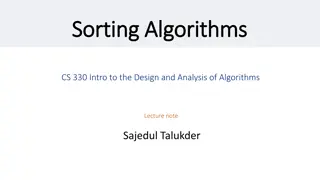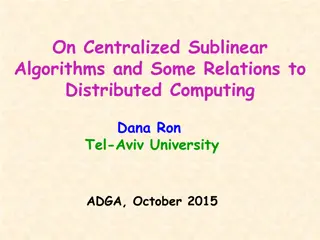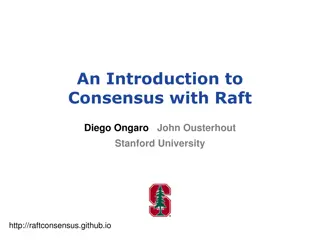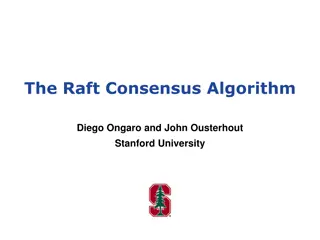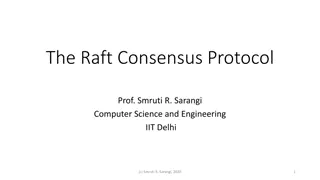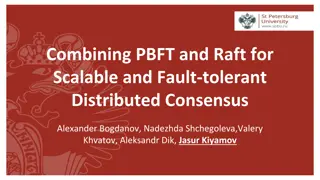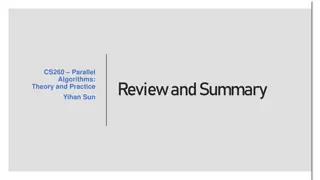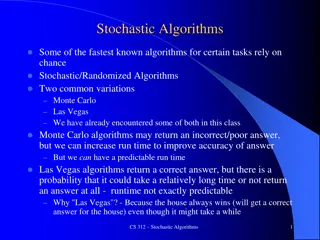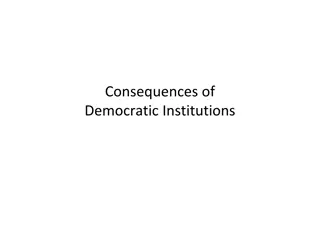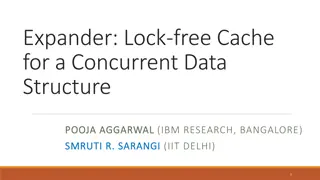Understanding Algorithms and Programming Fundamentals
Learn about algorithms, programming, and abstraction in computing. Explore the definition and properties of algorithms, the relationship between algorithms and programming, and the concept of abstraction. Discover how algorithms are like recipes and how abstraction simplifies complex tasks in comput
1 views • 17 slides
Greedy Algorithms in Optimization Problems
Greedy algorithms are efficient approaches for solving optimization problems by making the best choice at each step. This method is applied in various scenarios such as finding optimal routes, encoding messages, and minimizing resource usage. One example is the Greedy Change-Making Algorithm for mak
0 views • 12 slides
Expert Consensus Statement on Exercise for Type 2 Diabetes
This expert consensus statement provides an update on exercise recommendations for individuals with type 2 diabetes (T2D), emphasizing the benefits of physical activity in improving glycemic management, insulin sensitivity, cardiovascular health, and overall disease risk reduction. The document high
0 views • 16 slides
Near-Optimal Quantum Algorithms for String Problems - Summary and Insights
Near-Optimal Quantum Algorithms for String Problems by Ce Jin and Shyan Akmal presents groundbreaking research on string problem solutions using quantum algorithms. The study delves into various key topics such as Combinatorial Pattern Matching, Basic String Problems, Quantum Black-box Model, and mo
0 views • 25 slides
Understanding Approximation Algorithms: Types, Terminology, and Performance Ratios
Approximation algorithms aim to find near-optimal solutions for optimization problems, with the performance ratio indicating how close the algorithm's solution is to the optimal solution. The terminology used in approximation algorithms includes P (optimization problem), C (approximation algorithm),
2 views • 10 slides
Overview of Cryptography Techniques and Algorithms
Exploring the diverse realm of cryptography, this chapter delves into both nonmathematical and mathematical encryption methods. It covers substitution and transposition ciphers, steganography, hybrid systems, hashing, symmetric algorithms like DES and AES, as well as asymmetric algorithms utilizing
7 views • 21 slides
Combining Graph Algorithms with Data Structures and Algorithms in CSE 373 by Kasey Champion
In this lecture, Kasey Champion covers a wide range of topics including graph algorithms, data structures, coding projects, and important midterm topics for CSE 373. The lecture emphasizes understanding ADTs, data structures, asymptotic analysis, sorting algorithms, memory management, P vs. NP, heap
0 views • 38 slides
Understanding Randomized Algorithms: Types and Examples
Explore the world of randomized algorithms through types like Las Vegas and Monte Carlo, with a focus on classic examples such as Quick Sort. Learn how randomness plays a crucial role in computation and discover the principles behind these algorithms. Dive into the applications of randomized algorit
0 views • 22 slides
Understanding Randomized Algorithms: A Deep Dive into Las Vegas and Monte Carlo Algorithms
Randomized algorithms incorporate randomness into computations, with Las Vegas algorithms always providing the correct answer but varying in time, while Monte Carlo algorithms occasionally give wrong answers. Quick Sort is a classic Las Vegas algorithm that involves pivoting elements for sorting. Ch
4 views • 21 slides
Economic Models of Consensus on Distributed Ledgers in Blockchain Technology
This study delves into Byzantine Fault Tolerance (BFT) protocols in the realm of distributed ledgers, exploring the complexities of achieving consensus in trusted adversarial environments. The research examines the classic problem in computer science where distributed nodes communicate to reach agre
0 views • 34 slides
Distributed Consensus Models in Blockchain Networks
Economic and technical aspects of Byzantine Fault Tolerance (BFT) protocols for achieving consensus in distributed ledger systems are explored. The discussion delves into the challenges of maintaining trust in adversarial environments and the strategies employed by non-Byzantine nodes to mitigate un
0 views • 34 slides
Understanding Algorithms and Programming: A Visual Introduction
Explore the fundamental concepts of algorithms and programming through visual representations and practical examples. Learn about algorithmic thinking, abstraction, recipe-like algorithms, and the importance of logical steps in accomplishing tasks. Discover how algorithms encapsulate data and instru
1 views • 17 slides
Distributed Algorithms for Leader Election in Anonymous Systems
Distributed algorithms play a crucial role in leader election within anonymous systems where nodes lack unique identifiers. The content discusses the challenges and impossibility results of deterministic leader election in such systems. It explains synchronous and asynchronous distributed algorithms
2 views • 11 slides
Understanding Networking Principles and Routing Algorithms in Distributed Systems
Delve into the intricacies of networking principles and routing algorithms in distributed systems. Explore the four layers studied, including the network layer that handles routing. Discover the role of routers in forwarding packets between networks and the challenges of designing routing algorithms
1 views • 23 slides
Mathematical Analysis of Algorithms in CMPE371 - Fall 2023-2024
Explore the mathematical analysis of algorithms in CMPE371 for Fall 2023-2024, focusing on non-recursive and recursive algorithms. Learn how to analyze non-recursive algorithms by deciding on input size parameters, identifying basic operations, and simplifying summations. Dive into recursive algorit
1 views • 31 slides
Pseudodeterministic Algorithms and Their Application in Search Problems
Pseudodeterministic algorithms provide a unique approach to the search problem associated with binary relations, offering an error reduction technique while sacrificing the ability to approximate the average value of a function. By introducing m-pseudodeterministic and pseudo-pseudodeterministic alg
1 views • 6 slides
Comprehensive Algorithms for Cytogenomic Testing in Hematologic Malignancies
This document outlines clinical algorithms for the genetic evaluation of chronic lymphocytic leukemia (CLL), myelodysplastic syndromes (MDS), aplastic anemia, and idiopathic acquired aplastic anemia. It provides detailed protocols for genetic testing, including SNP array karyotyping, cytogenetic and
0 views • 8 slides
Exact Byzantine Consensus on Undirected Graphs: Local Broadcast Model
This research focuses on achieving exact Byzantine consensus on undirected graphs under the local broadcast model, where communication is synchronous with known underlying graphs. The model reduces the power of Byzantine nodes and imposes connectivity requirements. The algorithm involves flooding va
0 views • 7 slides
Understanding Greedy Algorithms in Algorithm Analysis
Greedy algorithms are a simpler approach compared to dynamic programming, focusing on making locally optimal choices in order to achieve a globally optimal solution. While not always yielding the best solution, greedy algorithms can provide optimal solutions for problems with specific characteristic
1 views • 23 slides
Understanding Paxos and Consensus in Distributed Systems
This lecture covers the concept of Paxos and achieving consensus in distributed systems. It discusses the availability of P/B-based RSM, RSM via consensus, the context for today's lecture, and desirable properties of solutions. The analogy of the US Senate passing laws is used to explain the need fo
0 views • 46 slides
Understanding STL Algorithms: A Practical Guide
Explore the world of STL algorithms through an insightful discussion on the definition of algorithms, the advantages of using STL algorithms over raw loops, and the different classes of STL algorithms available. Discover how these pre-built libraries can enhance your programming efficiency and code
1 views • 99 slides
Exploring the Role of Algorithms in Game Design
Delve into the world of algorithms in game design, from understanding the fundamental concept of algorithms to their pervasive presence in various aspects of gaming, such as military simulations, medical simulations, and gameplay mechanics. Explore how algorithms shape experiences in different types
0 views • 10 slides
Evolutionary Computation and Genetic Algorithms Overview
Explore the world of evolutionary computation and genetic algorithms through a presentation outlining the concepts of genetic algorithms, parallel genetic algorithms, genetic programming, evolution strategies, classifier systems, and evolution programming. Delve into scenarios in the forest where gi
0 views • 51 slides
Understanding Consensus Algorithms in Paxos
Consensus algorithms play a vital role in distributed systems like Paxos. Paxos is a protocol that aims to achieve consensus among a majority of participants. It defines roles for nodes like proposers, acceptors, and learners, each serving a specific purpose in reaching agreement on a single value.
0 views • 24 slides
Online Advertising and Algorithms: Insights and Simplifications
Explore the world of online advertisements and algorithms through insightful discussions on online advertising, modern developments in online algorithms, and practical optimization strategies like budgeted allocation. Delve into topics such as decision-making under uncertainty, accessing algorithms,
1 views • 22 slides
Implementing Iterative Algorithms with SPARQL
This comprehensive guide explores the implementation of iterative algorithms with SPARQL, focusing on YarcData/Cray's approach to using these algorithms. It covers YarcData's interest in graphs, the Urika appliance, iterative algorithms in machine learning, implementation approach, and algorithms im
1 views • 12 slides
Byzantine Faults and Consensus on Unknown Torus
The discussion revolves around achieving consensus in the presence of dense Byzantine faults on an unknown torus. Various challenges and impossibility theorems are explored, highlighting the complexities of reaching an agreement in such fault-prone environments. The content delves into the limitatio
0 views • 23 slides
Overview of Sorting Algorithms and Quadratic Sorting - CS 330 Lecture Notes
Sorting algorithms play a crucial role in computer science and computing tasks, consuming a significant portion of computing power. Various algorithms such as Bubble Sort, Selection Sort, and Insertion Sort are discussed for sorting a list of values efficiently. Quadratic sorting algorithms like Sel
0 views • 30 slides
Understanding Sublinear Algorithms and Graph Parameters in Centralized and Distributed Computing
Centralized sublinear algorithms and their relation to distributed computing are explored, emphasizing the efficiency of algorithms in processing large inputs in sublinear time. Examples of sublinear algorithms for various objects are provided, along with the computation and approximation of graph p
1 views • 34 slides
An Introduction to Consensus with Raft: Overview and Importance
This document provides an insightful introduction to consensus with the Raft algorithm, explaining its key concepts, including distributed system availability versus consistency, the importance of eliminating single points of failure, the need for consensus in building consistent storage systems, an
0 views • 20 slides
The Raft Consensus Algorithm: Simplifying Distributed Consensus
Consensus in distributed systems involves getting multiple servers to agree on a state. The Raft Consensus Algorithm, designed by Diego Ongaro and John Ousterhout from Stanford University, aims to make achieving consensus easier compared to other algorithms like Paxos. Raft utilizes a leader-based a
0 views • 26 slides
Understanding the Raft Consensus Protocol
The Raft Consensus Protocol, introduced by Prof. Smruti R. Sarangi, offers a more understandable and easier-to-implement alternative to Paxos for reaching agreement in distributed systems. Key concepts include replicated state machine model, leader election, and safety properties ensuring data consi
0 views • 27 slides
Enhancing Distributed Consensus: Combining PBFT and Raft for Improved Security
Addressing challenges in distributed systems, this study proposes a novel approach by combining PBFT and Raft consensus mechanisms to enhance scalability and fault tolerance. The research highlights the importance of secure data storage and identifies new attack mechanisms in today's digital landsca
0 views • 11 slides
Comparison of Economic Reform Sequencing in China
Andrew K. Rose from NUS Business School compares China's economic reform sequencing with the Washington Consensus. The optimal reform sequencing includes stabilization before reform, real before financial reform, and domestic before international reform. China's approach aligns oddly with the Washin
0 views • 14 slides
Nordic LCA/PEF Consensus Seminar and Report 2016: Insights and Progress
Nordic Environmental Footprint Group (NEF) is a key Nordic authority cooperation group under the Nordic Council of Ministers dedicated to discussing and exchanging viewpoints on EU Commission testing and uses of Product and Organizational Environmental Footprint. Through workshops and seminars, NEF
0 views • 16 slides
CS260 Parallel Algorithms: Theory and Practice Review
This review covers essential topics from the CS260 Parallel Algorithms course by Yihan Sun, focusing on key concepts such as scheduler programs, cost models, reduce and scan techniques, PRAM models, atomic primitives, small algorithms, the master theorem, and sorting algorithms like Quicksort and Me
0 views • 25 slides
The Art of Reaching Consensus - Reinhard Scholl ITU-T Leadership Meeting
Explore the nuances of consensus-building, leadership roles, and decision-making processes. Gain insights into defining consensus, understanding opposition, and the chairman's pivotal judgment role. Learn tips on crafting consensus effectively and making crucial inquiries. Delve into the significanc
0 views • 36 slides
Exploring Stochastic Algorithms: Monte Carlo and Las Vegas Variations
Stochastic algorithms, including Monte Carlo and Las Vegas variations, leverage randomness to tackle complex tasks efficiently. While Monte Carlo algorithms prioritize speed with some margin of error, Las Vegas algorithms guarantee accuracy but with variable runtime. They play a vital role in primal
0 views • 13 slides
Perspectives on Democratic Institutions: Majoritarian vs. Consensus Vision
Democratic institutions have consequential impacts on political representation, economic policy, ethnic conflict, and democratic survival. Two distinct visions, majoritarian and consensus, shape the distribution of power in governance. The majoritarian vision concentrates power in the hands of the m
0 views • 112 slides
Understanding Lock-Free and Wait-Free Algorithms in Concurrent Data Structures
Illustration of lock-free and wait-free algorithms compared to blocking algorithms, with insights on concurrent object execution, blocking vs. non-blocking algorithms, definitions, comparisons between locks, lock-free, and wait-free approaches, and explanations on making algorithms wait-free. Exampl
0 views • 23 slides

